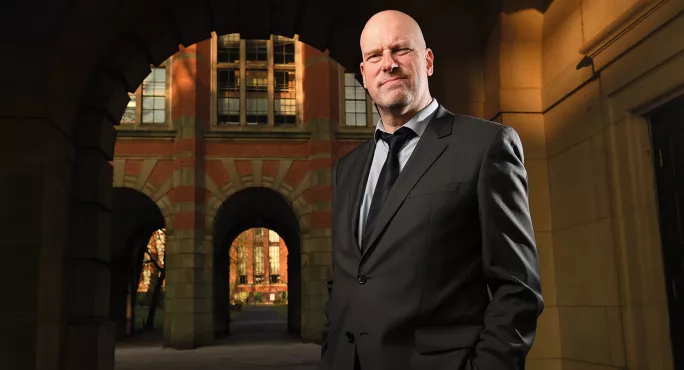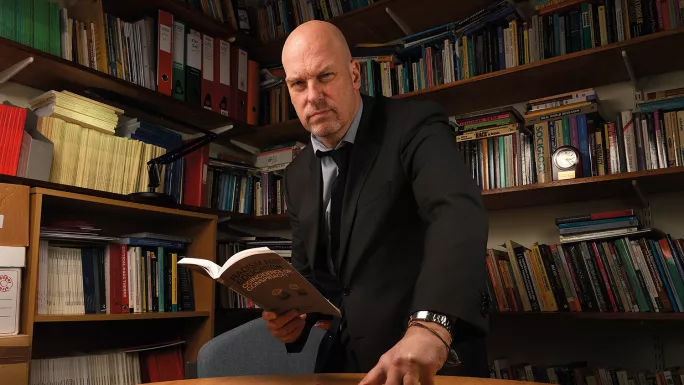
- Home
- TES talks to...David Gillborn
TES talks to...David Gillborn

After spending more than two decades investigating and researching racism in schools, Professor David Gillborn has come to a conclusion that will shock many teachers: England’s education system, he believes, is home to “insidious, institutionalised racism”.
The director of the Centre for Research in Race and Education at the University of Birmingham - and editor of the academic journal Race, Ethnicity and Education - says institutionalised racism is having a pernicious effect: black pupils are less likely to be in the top sets and less likely to take GCSEs in the academic English Baccalaureate subjects, and more likely to be in trouble with the teacher and even to be excluded.
“Where researchers have gone into schools, watched what happens in the classroom, spoken with teachers and hung around in staff rooms, it’s very clear that teachers - like many other groups in society - operate on a range of stereotypes about which kids are likely to be causing trouble and which kids are likely to excel,” he says. “The overwhelming response to black British kids in school classrooms is that they’re more likely to be causing trouble than they are to be excelling in academia.”
He says that this stereotyping is not necessarily something that a teacher is aware they are doing.
Stereotyping is not necessarily something a teacher is aware they are doing
“I’m not suggesting that teachers walk into a classroom and think, ‘How can I pick on the black kids today?’” he says. “It’s a thing that white people learn from very early on and it’s reinforced through television and the media. We learn a different set of expectations about different ethnic groups.”
His research suggests that this causes teachers to set lower expectations for black pupils than for their peers. In 2012, he published an in-depth study of black middle-class parents that found many believed schools were failing to stretch their children.
“Overwhelmingly, [the parents] were saying, ‘You just get a sense that the teachers look at the kid and as long as the kid is [going to achieve] five A to C grades the teachers are happy and they’re not pushing them,’” he says.
By contrast, Gillborn explains, academic research suggests that teachers have much higher expectations of their students with Chinese heritage.
Unconscious prejudice
As well as being less likely to be stretched, black pupils are more likely to be disciplined, he says. “If a group of kids with different ethnic backgrounds are talking and a teacher calls out a name, they’re much more likely to call out the name of a black child,” he says.
“[When] a kid’s name gets called out, the teacher has in their mind that that kid’s always in trouble. So if something happens, the school’s reaction tends to be to move that student through the disciplinary procedures more quickly than would happen to kids in other groups.”
On hearing Gillborn’s views, teachers might respond that the very nature of their job - the fact that they see their pupils regularly and actually get to know them as individuals - stops them from reverting to lazy stereotypes.
But he argues that those stereotypes affect how a teacher goes about getting to know their pupils.
“If, at the end of the week, you remember certain kids as being the kids you had to tell to take their coat off, that’s colouring your view of those students,” he says. “[Teachers should] have an awareness that actually there were other kids doing exactly the same thing, but it was that student who caught your eye... these things are incredibly subtle.”
A lot of research on racism is now discounted - people say you’re causing resentment
Gillborn’s ideas haven’t always gone down well in the academic community. He has been accused of stirring racial tensions and of being racist about white people.
“A lot of research on racism is now discounted because people say you’re causing resentment, you’re attacking white people, it’s racist,” he says.
Another difficulty is that this is not the sort of research that can be proven to be true with a straightforward bit of number-crunching. Finding solid evidence of these complicated patterns of human behaviour is tough.

“The research that picks up on those things [ie, racism in the education system] tends to be much more expensive to do, because you have to be inside classrooms watching what happens,” he says. “So that research tends to take place much less often…[and] be small-scale.”
In fact, Gillborn is getting frustrated with being asked for proof that discrimination is a problem. He believes the existing data already shows that it is.
“It’s not an accident that black Caribbean kids are three times more likely to be expelled than their white British peers,” he says. “Why would I need to prove it’s because of racism?
“To start from an assumption that racism isn’t part of it unless I can prove otherwise is to say, ‘Let’s assume everything is fine and dandy.’”
Gillborn also appears to be growing tired of another argument: that he should really be looking at the effect of family income or social class.
Figures published by the Joseph Rowntree Foundation social research charity last year showed that 22 per cent of children from black Caribbean backgrounds were growing up in poverty, compared with 15 per cent of white children - and there is academic evidence that poverty has a damaging effect on children’s educational attainment.
“Very often when you [present] research on race, someone in the audience will say, ‘Class is a bigger deal, isn’t it?’” he says. “You can’t address stuff with a scalpel and pull out which section is down to race and which section is down to class.”
But the views from his study of black middle-class parents suggest that the problem is about more than class, he adds.
Can teachers counter what he believes is inbuilt racism in the system? He is urging teachers to try to work out whether discrimination is happening in their schools. A good starting point could be pupils’ disciplinary records, he says.
Gillborn’s own study of one school’s records suggested that white pupils were likely to be disciplined for breaking specific rules, whereas black pupils were in trouble for much vaguer things such as having a “bad attitude”. This could be a sign things are going wrong, he says.
Overall, he wants teachers to be more self-aware and self-questioning about their decisions.
“You have to build in processes through which we as professionals question ourselves about the outcomes of what we’re doing,” he says. “We shouldn’t think that because something is unexceptional, there’s not a problem. It’s about interrupting the everyday.”
Kaye Wiggins is a freelance journalist. She tweets @kayewiggins
Register with Tes and you can read five free articles every month, plus you'll have access to our range of award-winning newsletters.
Keep reading for just £4.90 per month
You've reached your limit of free articles this month. Subscribe for £4.90 per month for three months and get:
- Unlimited access to all Tes magazine content
- Exclusive subscriber-only stories
- Award-winning email newsletters
You've reached your limit of free articles this month. Subscribe for £4.90 per month for three months and get:
- Unlimited access to all Tes magazine content
- Exclusive subscriber-only stories
- Award-winning email newsletters



